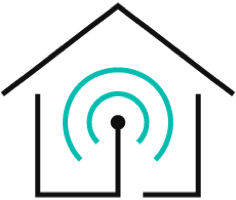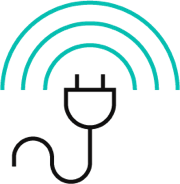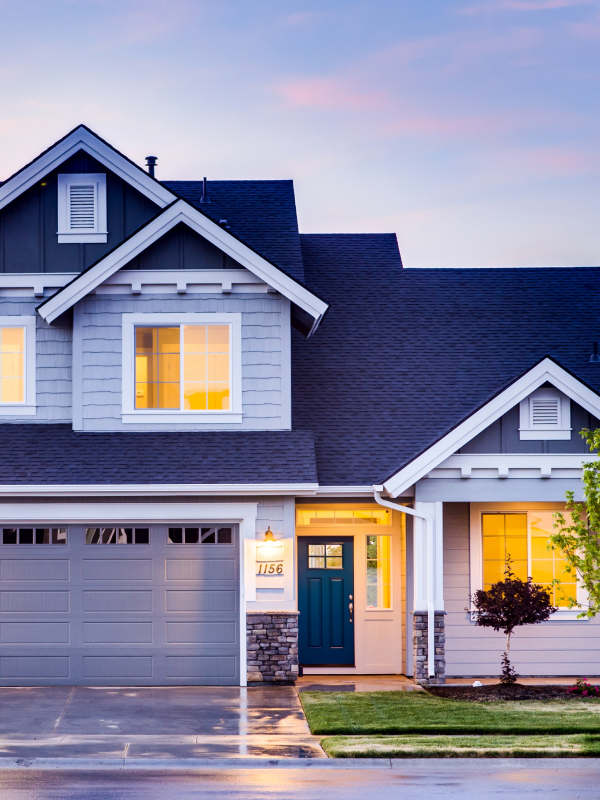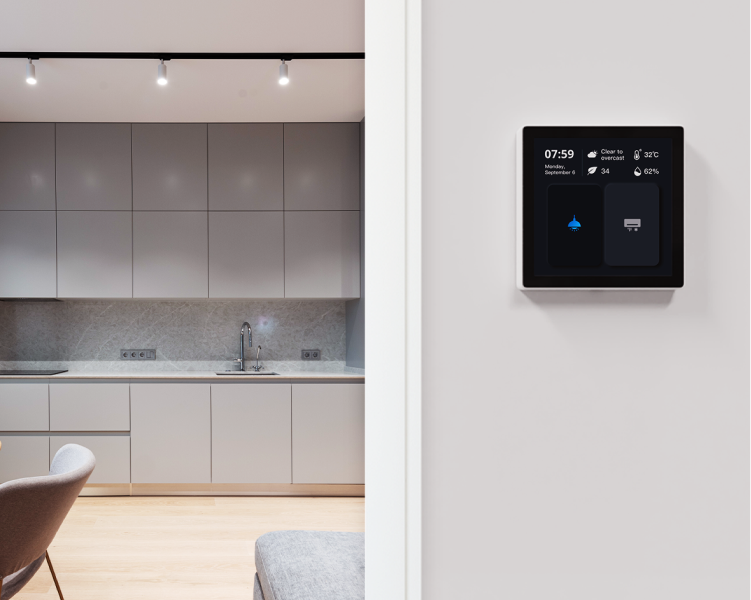Suppose you’re ready to upgrade your premise but aren’t sure where to start or how to achieve the level of automation you envision. In that case, Evvr has the solution for you. However, creating environments by immersing a space with technology to save energy, provide security and increase comfort requires a controller that harmonizes any space within your smart home ecosystem. So what is the best home automation controller for your needs?
Before deciding on what home automation controller is best for you it helps to understand the benefits of a smart home controller, so that you can create the best home automation system for any space.
- Home Automation Network
- Holistic smart home automation starts with a controller
- Selecting a home automation controller
- Local, Reliable, Secure and Private Control
Home Automation Network
For those new to home automation, you may not yet have digested how to network your smart home. Determining how you want to network your smart home will help you choose the right controller for your home automation system.
Smart home hubs
There are several networking devices, including a router, gateway, bridge, switch and hub. A smart home hub is an essential component of a home automation system. The hardware connects local area network (LAN) devices through a common language (protocol), including an internet protocol or a wireless one (e.g. Z-Wave). Typically, a hub includes hardware, software and configuration to start talking with compatible gadgets immediately. Additionally, you can configure a smart home hub to receive digital packets of data or analog data to signal outward.
A word about gateways: there are some hubs that can only speak one language (WiFi). You’d need a gateway to communicate between two languages like WiFi and Z-Wave. Many hubs are also gateways.
The more languages a home automation hub speaks, the greater interoperability it affords. Why is interoperability important? Suppose a doorbell rings, and you touch a button or use your voice to activate your home assistant to unlock the smart lock to let them inside.
As you can see, interoperability is pivotal to coordinating the activity of compatible devices. However, there isn’t one home automation hub — not the SmartThings hub, Alexa or Google Nest hub — that can control every smart home device. Therefore, the best home automation controller is one that is open to any smart home gadget you see fit to add to your system.
IoT networks
As technology advances, a hub may not be necessary for communication between devices. For example, before setting foot in the kitchen, you can tell your home assistant to make coffee, and a smart plug starts the coffee machine. The smart plug easily makes any of your home appliances ‘smart,’ adding them to the Internet of Things (IoT) through smart sensor technology.
The main advantage of networking IoT devices is that it spares your router from doing all the heavy lifting. Nodes placed throughout an area create cloud coverage for each connected device. Also, nodes extend the cloud coverage and increase bandwidth for a device in range of more than one node. Another benefit is that nodes can automatically update for greater security.
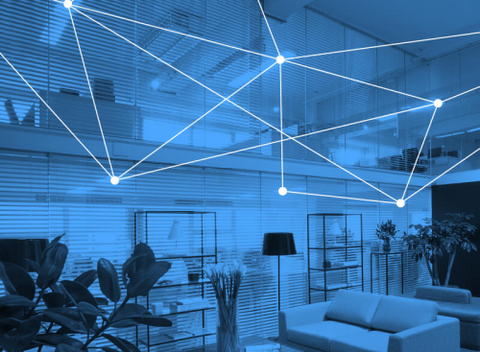
Most of us are highly connected to the internet — through several smart home products like a smart light, ring alarm, Apple TV or smart speaker — but don’t have a complete smart home system. A significant advantage of the mesh network is its reliability. Should one node go down, life continues uninterrupted because the other nodes will cover the gap. A downside of a mesh network is that data stored on a public cloud isn’t as secure and private as local networks. A powerful, reliable and secure network’s potential is exciting, but home automation isn’t possible without a controller.
Whether using a hub or IoT approach to link the technology, interoperability is pivotal to meeting your current and future needs. Your network requires another component to reach the home automation most of us desire for living in the moment. For an effortless experience, you need a home automation controller.
Holistic smart home automation starts with a controller
Compatible devices and a hub or mesh network that connects them is the system, but what is the controller's role? Many refer to a home automation controller as a brain or a manager. A controller adds and removes devices to the network, grouping and configuring them to perform tasks. Think of all the systems which could need managing:
- Home security.
- Landscape irrigation.
- Outdoor lighting.
- Indoor lighting.
- Heating and cooling.
- Home entertainment.
- Smart lock systems.
- Parental controls.
A controller with the broadest range of technology will be the most scalable and flexible for your needs. You won’t go wrong looking for a controller with Z-Wave technology. Tens of thousands of smart home products use the Z-Wave low-frequency radio band. The advantages are its low power, long-range (100 feet) and less interference (908.4 MHz) than the higher bandwidth (2.4 Ghz) WiFi or Bluetooth.
Another protocol to look for in a controller is the open-source Zigbee. Unlike Z-Wave's registered technology, the Zigbee standard is free to use and home automation brands are definitely using it. In 2020, 560 certified Zigbee devices were launched, according to the Zigbee Alliance. Zigbee technology is less expensive than Z-Wave for developers to use and faster (it can reach the 2.4 GHz bandwidth): making it another ubiquitous technology that your smart home controller must have.
Selecting a home automation controller
As we’ve noted, smart home brands know that humans want options, and that includes how they set up their home automation ecosystem. Do you want voice control? Tap a touchscreen? Open a door remotely? Or, all of the above? Smart home controllers should offer you the freedom to set-and-forget scenes for everyday life and special circumstances like the changing seasons or time away from your home or office.
Suppose you’d like to automate your hotel ground’s environmental systems without adding a layer of complexity to your staff schedule. Additionally, your grounds include a mix of guest rooms, suites and conference spaces as well as entertainment spaces and private villas farther away from the main building. You need a robust home automation controller to connect and control every smart thermostat and security camera on your property.
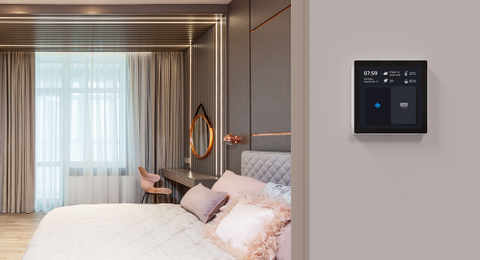
It would need the computing power and design to talk with thousands of smart devices and coordinate actions such as opening a door, turning on the lights as a welcome and lowering shades when the room temperature rises too high. Furthermore, your guests will certainly enjoy being pampered uninterrupted by housekeeping. Manage your home automation without worry of commands missing a connected device, overloading the controller or losing scenes to a power outage with the best home automation controller offering:
- A high-performance control processor.
- Enterprise-class risk management features.
- Modules to integrate with the latest smart devices.
- Storage upgrades for complicated automation.
- High-availability and built-in redundancy.
- Multiple interfaces for one-system control.
Local, Reliable, Secure and Private Control
Evvr offers three home automation controllers to harmonize every space.
Full-scale home automation control
The Evvr Center is suited for large spaces with more complex scenario requirements. Its advanced computing, memory and processing power will coordinate with 3,000 smart devices and cover more than 100 rooms. How does this controller handle all that activity? Reliability is built-in to the Evvr Center. Its load balancing function will distribute a high workload to available devices, rerouting when power is low to minimize interruptions for you. Reducing interruptions means fewer slowdowns, dropped requests or crashes with Evvr Center.
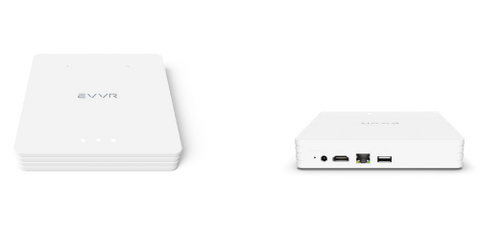
Private smart home control
Immerse your family and guests in a carefree and secure smart home environment with Evvr Center Lite. Like the Evvr Center, this sleek controller is versatile and provides privacy. Data stored locally and not in the cloud keeps it more secure. Simultaneously, Evvr Center Lite connects and controls to any smart device using three popular wireless protocols: Bluetooth LE (BLE), Zigbee 3.0 and Z-Wave for the UK, US and Australia.
Compact and cost-effective home automation controller
Home automation is for everyone, apartment dwellers and homeowners alike. Evvr Hub is a compact controller that does everything its larger counterparts do with a smaller range. This hub is portable, easy to install and comes with the SDK developers can appreciate for rapid customization and integration. Evvr Hub will connect with another hub or the Evvr Center to extend control and reliability without sacrificing security and privacy.
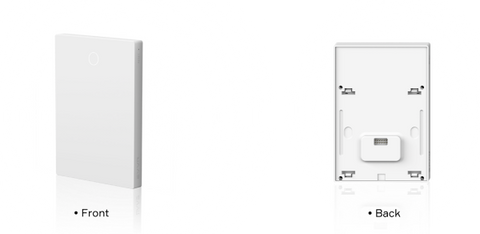
For more ideas on how Evvr controllers can elevate your home automation ecosystem, contact us to learn more informations.

